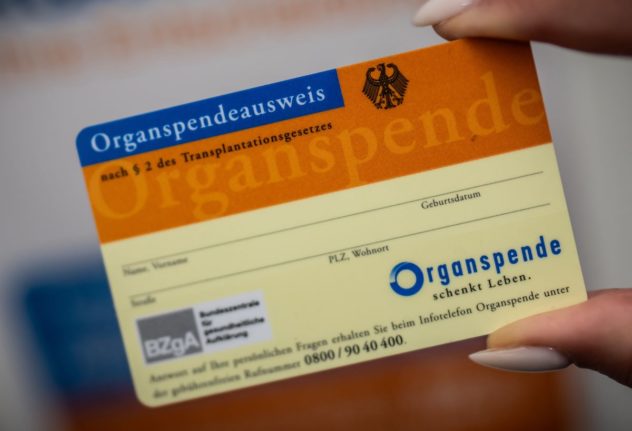A central registry for organ donation was launched on Monday, which allows users to save their preferences online and more easily update them in the future.
According to surveys, the majority of people have a positive attitude toward organ donation after death. But when it comes to officially opting-in as an organ donor in writing, many people hesitate.
Those in support the new registry hope that it will ensure that medical professionals can more readily identify a patient’s organ donation preferences.
How does organ donation in work Germany?
Last year, 965 people donated one or more organs after their death. That was 96 more than in 2022 (a year in which donations had declined), according to the German Organ Transplantation Foundation.
However, there were almost 8,400 people on the waiting lists for a transplant during the same period.
In order for organ donation to be considered at all, two specialists must independently confirm the complete and irreversible failure of the cerebrum, cerebellum and brain stem, i.e. brain death.
Germany is an “opt-in” country regarding organ donation. This means that individuals need to explicitly register their consent to be organ donors, usually with their physicians.
In contrast, under “opt-out” systems for organ donation, individuals are considered eligible organ donors unless they register to be remove their consent.
Research has shown that opt-out consent systems dramatically increase the number of successful organ transplants performed each year, and reduces waiting list numbers.
READ ALSO: Dead Olympic coach saves 4 lives with organ donations
Sweden, Luxembourg, Bulgaria, Greece, Iceland and all regions of the UK are among European countries that have an opt-out system in place. Spain is an example of a hybrid model in which the country operates with “presumed consent” but families are also consulted and have the final say.
Making the switch to an opt-out organ donation system was a topic of debate in Germany in 2020, but ultimately the Bundestag voted against it.
Instead the Bundestag passed an initiative by a group of MPs, and led by current Foreign Minister Annalena Baerbock (Greens), to “strengthen the willingness to make decisions in organ donation”.
To this end, anyone who applies for an identity card from the age of 16, renews it after 10 years or obtains a passport should receive information about registering as an organ donor. Family doctors are also encouraged to inform patients about organ donation every two years in an open-ended manner.
Additionally, the new online registry has been created.
Why is it important to have a digital database?
Ultimately, the new registry aims to make it easier for doctors to quickly and reliably clarify a possible willingness to donate.
A decision can still be documented on a piece of paper, in a living will or on organ donor cards, which are available in doctors’ offices, pharmacies and for download from the Internet.
But while papers and cards often can’t be found in an emergency, an entry in the digital registry provides clarity and security, argues Health Minister Karl Lauterbach (SPD). “Above all, it relieves relatives of the burden of making a difficult decision in an emergency.”
When no decision has been formally expressed by the deceased, spouses, adult children or siblings are consulted.
How do I register?
The portal, which has been set up by the German Institute for Drugs and Medical Devices, can be found at www.organspende-register.de.
From Monday, it will be possible to register there with an ID card that has an online function (eID). Since 2017, all residence permits and personal ID cards in Germany have been issued with an electronic chip containing your personal data.
By July 1st, clinics that remove organs will be able to search for and retrieve declarations in the registry. By September 30th, it should also be possible to register via health insurance apps. This is important because some people’s ID card may not be activated (although you can do that if you wish do – more details here.
READ ALSO: How German health insurance costs are set to rise from 2024
You can register voluntarily from the age of 16. Registrants may choose from five options:
- “Yes, I allow organs and tissues to be removed from my body after the medical determination of my death”;
- “Yes, I allow this, with the exception of the following organs/tissues”;
- “Yes, I allow this, but I only want to release certain organs/tissues for donation”;
- “My next of kin shall then decide on yes or no”;
- “No, I object to the removal of organs or tissues.
Entries can be changed or deleted. Whether on paper or digitally, the most recently selected preference is applied.
With reporting by Paul Krantz



 Please whitelist us to continue reading.
Please whitelist us to continue reading.
Member comments